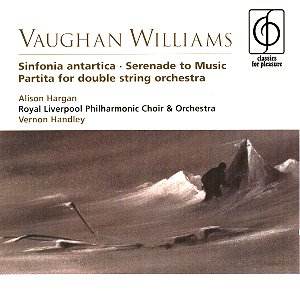Another in the series of reissues of discs recorded
by Vernon Handley. With additional organ dubbed in from a session at
Liverpool’s Anglican Cathedral earlier in 1990, Handley produces authoritative
performances of all three works from choir and orchestra. Whether the
version of the familiar Serenade works for chorus is debatable, lacking
the vocal variety of its original form for sixteen soloists (there is
also a version for just four singers), but if diction from the choir
is less than clear, their purity of sound and internal balance is more
than just commendable.
The Partita for double string orchestra also had other
guises, such as one for double string trio. It was begun in 1938 but
proved troublesome and took another ten years before Boult broadcast
it in March 1948. Somehow it has never caught on. Maybe it has been
overshadowed by the Fantasia on a Theme of Thomas Tallis, but its style
meanders from his own individual one to those such as his contemporaries
Bartók, Stravinsky or even Tippett. Of the four movements it
is obviously the third which appeals most at first hearing, the Intermezzo
subtitled ‘In homage to Henry Hall’ the dance bandleader whose signature
tune ‘Here’s to the next time’ gets an oblique quote. Handley’s recording
is justifiably still considered to be the best to date for this is a
work that needs careful handling (no pun intended).
Vaughan Williams was a fairly prolific composer of
film scores, eleven of them completed between 1940 and his death in
1958. Ealing Studios commissioned him for the music to the 1949 film
Scott of the Antarctic, a subject which had long fascinated him.
As his widow relates, ‘musical equivalents for the physical sensations
of ice, of wind blowing over the great, uninhabited desolation, of stubborn
and impassable ridges of black and ice-covered rock, and to suggest
man’s endeavour to overcome the rigours of this bleak land and to match
mortal spirit against elements’. The scoring is vast, the percussion
department including the obligatory wind machine, but there is also
a piano, organ, and wordless female chorus and solo soprano to add to
the colourful effects of a colourless landscape. Each movement is prefaced
by a text (Shelley, Coleridge, Donne, a psalm, and words from Scott’s
last diary) which the listener is meant to read. Barbirolli gave the
first performance in 1952, Boult soon took it up, and Handley made his
mark with it twelve years ago in what is a compellingly driven account
which will chill you to the bones in this reissue.
Christopher Fifield
See
other Handley Classics for Pleasure releases


